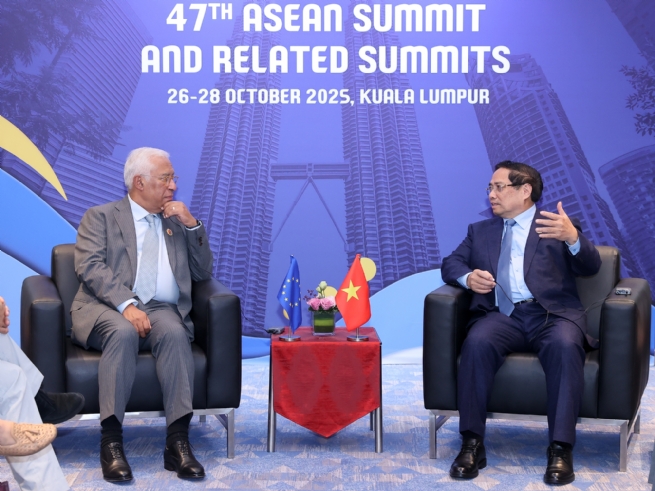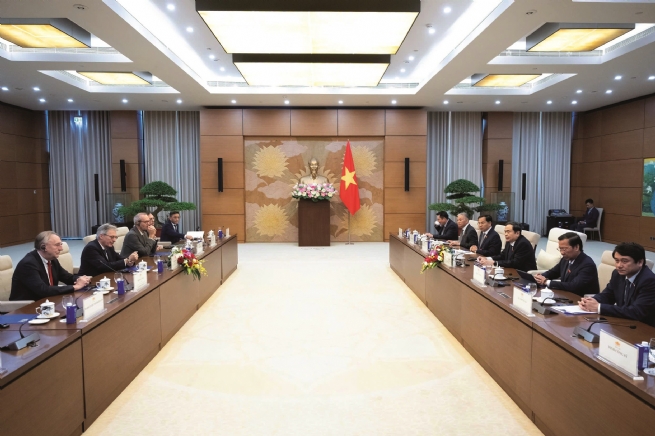3:34:36 PM | 11/19/2025
Vietnam and the European Union (EU) established diplomatic relations on November 28, 1990. Over the past 35 years, the partnership has made remarkable progress. During recent high-level meetings, both sides agreed to work together to elevate their bilateral relationship in the coming period.
Important partnership
Looking back over 35 years of development, it is clear that the EU, with its 27 member states, has remained one of Vietnam’s most important partners.

Prime Minister Pham Minh Chinh (R) and European Council President Antonio Costa in Malaysia, October 2025
The establishment of diplomatic relations in 1990 with the European Community, which then had 12 member states in Western Europe, marked Vietnam’s gradual emergence from Western isolation and embargo. This milestone had a positive impact on Vietnam’s foreign relations and its international integration process, which began under the spirit of the 6th National Congress of the Communist Party of Vietnam in December 1986.
Vietnam-EU cooperation began with humanitarian aid and postwar recovery, followed by the signing of the Framework Cooperation Agreement (FCA) in July 1995. Since then, the EU has supported Vietnam during its early and challenging stages of global integration through major technical assistance and institutional capacity-building programs. Notably, the EuroTAPViet Program (1994-1999) aided Vietnam’s transition to a market economy and was the EU’s largest technical assistance project in Asia at the time. The Multilateral Trade Policy Assistance Program (MUTRAP) (1998-2017) further helped Vietnam implement trade reforms and align with international standards.
The EU is one of Vietnam’s largest providers of non-refundable official development assistance (ODA). From 1993 to 2013, EU ODA accounted for 20% of total international donor commitments to Vietnam, including US$1.5 billion in non-refundable aid. Between 2014 and 2020, the EU provided €400 million in grants focusing on sustainable energy and institutional capacity building.

National Assembly Chairman Tran Thanh Man welcomes Bernd Lange, Chair of the European Parliament’s Committee on International Trade; Achim Post, Vice President of the Social Democratic Party of Germany, October 2025
Both sides also maintain regular consultations and coordination on key regional and global issues, particularly peace and security, climate change response, rules-based free trade, sustainable development, and non-traditional security challenges.
Vietnam is a key EU partner in Southeast Asia and the country with the most agreements signed with the bloc. These include the EU-Vietnam Partnership and Cooperation Agreement (PCA), effective 2016; the EU-Vietnam Free Trade Agreement (EVFTA), effective August 1, 2020; and the Voluntary Partnership Agreement on Forest Law Enforcement, Governance, and Trade (VPA-FLEGT), effective June 2019. The two sides also signed the Framework Participation Agreement (FPA) on defense and security cooperation in October 2019 and maintain an annual Human Rights Dialogue.
The EU has committed to supporting Vietnam’s sustainable and inclusive development, aligned with the country’s Socio-Economic Development Strategy 2021-2030, its National Green Growth Strategy, and the EU’s Global Gateway and Indo-Pacific Strategy. Under this framework, the EU has allocated €210 million for 2021-2024 and €83 million for 2025-2027.
Elevating bilateral relations
With a market of about 450.4 million people (as of January 1, 2025) and a nominal GDP per capita estimated by the IMF at approximately US$44,220 in 2024, the EU remains one of Vietnam’s top economic partners. Vietnam-EU trade has grown dozens of times over the past 35 years, making Vietnam the EU’s largest goods trading partner in ASEAN. Notably, the EVFTA has strongly accelerated bilateral trade.
According to the National Statistics Office of Vietnam, in less than five years (from August 2020 to May 2025), bilateral trade reached US$298 billion. This represents nearly 40% of the total trade value between the two sides (US$815 billion) accumulated over more than 30 years of cooperation since 1995, showing the EVFTA’s strong impact in expanding markets and strengthening economic ties.
The EU is Vietnam’s third-largest export market and fourth-largest import source. This growth reflects the complementary structure of the two economies. Vietnam mainly exports agricultural products, textiles, footwear, seafood, wood, and electronic components, while the EU supplies machinery, pharmaceuticals, high-tech equipment, and quality consumer goods.
The EU is also among Vietnam’s largest sources of foreign direct investment, primarily focusing on high-tech industries and services such as telecommunications, finance, banking, office leasing, and retail. European investors, with their technological strengths, have contributed to technology transfer, the creation of new industries and high-tech products, and job generation. While Vietnam’s investments in the EU remain modest, these projects have enabled Vietnamese enterprises to leverage business advantages and access the EU’s high-purchasing-power market.
During a phone call marking the 50th anniversary of the Liberation of the South and National Reunification (April 30, 1975 - April 30, 2025), European Council President Antonio Costa told General Secretary of the Communist Party of Vietnam To Lam that Vietnam and the EU are “important, reliable, and stable partners.” He welcomed the strong and dynamic development of bilateral relations across all areas, stressed that “Vietnam is a pillar partner of the EU in Southeast Asia, and the Vietnam-EU relationship deserves to be elevated to a new level,” and expressed hope that this partnership could serve as a model for the EU’s cooperation with other countries.
General Secretary To Lam affirmed that after 35 years of diplomatic relations, both Vietnam and the EU are entering a new stage of development. He suggested that the two sides actively engage in dialogue and coordination to find common solutions to overcome existing challenges and further strengthen economic cooperation in the coming years.
Deputy Prime Minister Bui Thanh Son said that Vietnam-EU relations are entering a new phase toward a Comprehensive Strategic Partnership. He highlighted the need to strengthen cooperation across all areas, promote high-level visits to deepen collaboration in politics, diplomacy, trade, investment, security, and defense, and expand cooperation in emerging fields such as science and technology, innovation, green economy, and climate change response.
LA (Vietnam Business Forum)